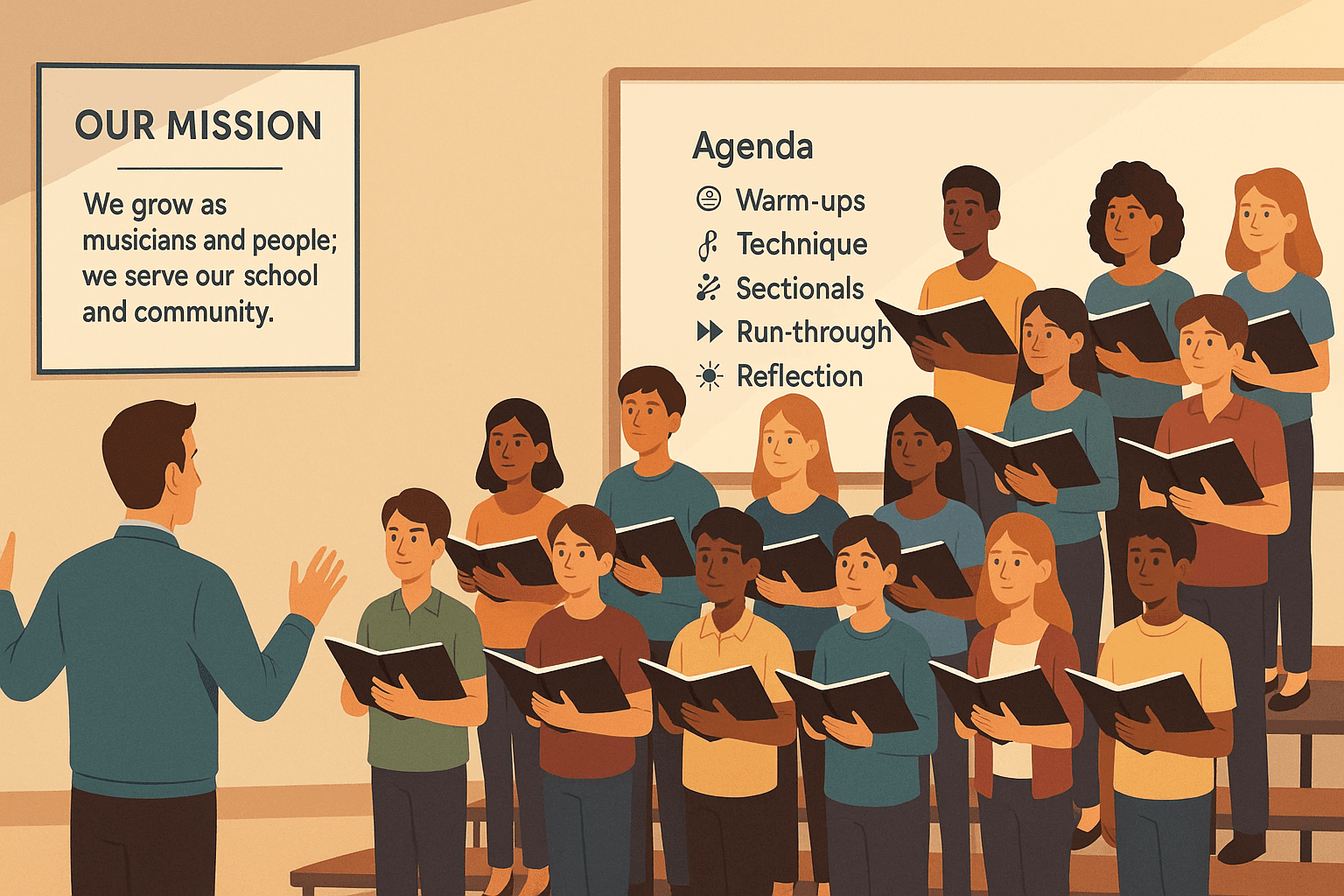Memorizing vs Embodying
Ideally, our choir should have their music memorized for the concert; it will make for a better concert than having our members hidden behind crinkly paper and being blinded by little dots with words attached to them. With their music memorized at the concert, they will be able to be more responsive to our conducting, more musically free and spirited, and more communicative.
The way in which our choir learns to memorize their music determines their ability to be responsive to our conducting, sing more freely, and be more communicative. In fact, memorization can sometimes even get in the way of a choir’s ability to be responsive, sing freely, and be communicative.
Try SIGHT READING FACTORY and save 10% using code: choralclarity
When traditional choir directors require music to be memorized by way of a “part test” the desired result will not be optimal. It is true that a highly-select group can succeed with this academic-driven approach; however with a self-selected or un-auditioned ensemble, where students of varying talents are joined together with a common goal of high-level music-making, this approach can do damage. screenpresso crack
Requiring home memorization along with a performance test sets a standard level at which some students will never be able to attain. Some parts might not fit into their vocal range, their technique or ear may not be strong enough, or they may just lack the confidence to perform under pressure. But more importantly, none of these factors have any bearing on how well students respond to our conducting, how musically free and spirited they sing, and how communicative and expressive they can be.
The way in which students memorize their music needs to be organic, not contrived. This is an issue with our traditional education system as well. Memorizing isolated facts seems to be an acceptable way for the traditional classroom; it is, in fact, a very low level of teaching and more importantly, a very low level for learning. powertoys crack
Proper memorization of music isn’t memorization at all; it is the embodiment of the art itself. It is being the art: living it, breathing it, and understanding how we are merely the vehicle through which the art form connects to our listeners. By requiring memorization, we have informed our students that art only happens when things are perfect. The reality is that our art begins the moment we touch a score. Art begins the moment we open our mouths. How we, the director, choose to rehearse the music, and how we choose to connect the music with our choir will determine how they embody the music.
The main obstacle that prevents students from naturally embodying the music is our rehearsal approach. I’ve listed the most common approaches that traditional choral directors take. None of these ways lead to the embodiment of the art:
1. Count-singing
Count-singing will get the notes and rhythms right but it will not draw students into the experience of music-making. There is nothing for them to grab on too, and therefore they will cling to the sheet music as long as possible. They view the learning of notes and rhythms to be separate from the art form.
2. Spoon-Feeding
Students look at the sheet music as they wait for us to give them everything. They’d bark like a dog if we told them too. When information is given to them this way, we shouldn’t expect any ownership on their part. There is no way to embody art when they aren’t connected to the art form itself.
3. Teaching 4 measures at a time and adding more measures each day
This is so common, and just so unproductive. Students have gained no sense of the big picture. They are stuck on 4 measures which have no relevance to anything else. Usually one part is taught at a time, and then parts are added together. While every rehearsal builds upon the previous rehearsal, the artistic thread created by the composer and poet is lost by the need to perfect notes and rhythms.
4. Part Tapes
If we hand them a part recording, we are giving them the answer key. An answer key has no meaning without the understanding of context. There is no artistic value to learning with part tapes. Only average and above-average singers will even have the ability to accurately memorize music from a part tape. Their part is isolated or accentuated over all other parts, which prevents the big picture from being fully understood. Again, the idea of learning the right notes and rhythms become the only goal.
Conclusion
All four ways listed above represent a traditional approach that only works with talented singers. I use the term “works” because we can get away with this approach, even though it really is preventative of a higher level of learning in all ensembles. In a selective setting, some directors believe that home memorization is the starting point at which their students can begin to be responsive to our conducting, sing freely, and be more communicative. The issue here is that once the music is “memorized”, there are still many details in the sheet music and “between the lines, if you will”, that have been left behind.
In a self-selected choir, a choir with multiple-levels of skill and ability, requiring home memorization of music is nothing more than a barrier; it separates the ones that can from the ones who can’t. It also sends a message that memorization is the final step to the music-making process.
Memorization is not the final step, nor is it the beginning step. In fact, it is not a step at all. It is a natural part of the embodiment process that occurs over time through intentional and effective rehearsing. This process will connect the choir to each other, to the music, and in turn, create living, breathing art.
Embodiment occurs as a result of a director’s awareness and understanding of this process. To gain a deeper understanding of how to naturally foster memorization during each rehearsal, subscribe to the choral clarity blog.







Leave A Comment